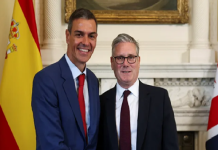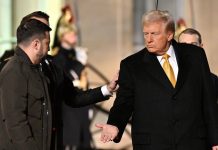CAIRO (AP) — Dozens of leaders and officials from Arab and Islamic countries said on Sunday that Israel’s actions in Jerusalem and the occupied West Bank have risen as violence between Israelis and Palestinians rises. He warned that it could exacerbate unrest in the region.
The meeting in Cairo was hosted by the Arab League and was attended by Egyptian President Abdel Fattah El-Sisi, Jordan’s King Abdullah II, Palestinian President Mahmoud Abbas, and many foreign ministers and dignitaries.
The high-level meeting took place at a time of one of the deadliest fighting in years in Jerusalem and neighbouring Israeli-held territory. Forty-five Palestinians have been killed so far this year, according to an Associated Press tally. During this period the Palestinians killed 10 of them on the Israeli side. Conference speakers condemned Israel’s “unilateral actions” in Jerusalem and the West Bank in statements that included demolishing homes and expanding settlements.
They also condemned visits by Israeli officials to holy sites in the disputed city, sacred to both Jews and Muslims and often the epicentre of unrest in Israel and Palestine.
There was no immediate comment from the Israeli government.
Officials also spoke out in support of Jordan’s role as guardian of Islam’s third holiest site, the Al-Aqsa Mosque. The mosque was built on a hill in the Old City of Jerusalem, the holiest place for Jews. It is called the Temple Mount because it was the site of an ancient Jewish temple.
Since Israel captured the site in the 1967 Mideast War, Jews have been allowed to visit but not pray there. Israel claims all of Jerusalem as its undivided capital, while the Palestinians seek east Jerusalem as the capital of their future state.
Calling Jerusalem “the backbone of the Palestinian cause,” el-Sissi warned of dire repercussions of any Israeli move to change the status quo of the holy site, saying they would “negatively impact” future negotiations to settle the Israeli-Palestinian conflict.
He said such measures would impede the long-sought-after two-state solution to the conflict, which would leave “both parties and the whole Middle East with difficult and grave options.”
El-Sissi, whose country was the first Arab nation to establish diplomatic ties with Israel, called on the international community to “reinforce the two-state solution and create conducive conditions for the resumption of the peace process.”
King Abdullah II also called for Israel to cease its violations and incursions into the Al-Aqsa Mosque.
“The region cannot live in peace, stability, and prosperity without any progress made on the Palestinian cause,” he warned. Ahmed Abul Gheit, executive director of the pan-Arab organization, also said attempts to split up the al-Aqsa mosque and erase its Arab and Islamic identities “will foment endless unrest and violence.” Let’s go,” he warned.
Palestinian President Abbas said the Palestinian government will approach the United Nations and its agencies to demand a resolution to safeguard the bilateral settlement of the dispute.
“The State of Palestine will continue to appeal to international courts and bodies to protect the legitimate rights of our people,” he said.
An ongoing game of violence is unsettling the region. Last month, US Secretary of State Anthony Brinken met with Egyptian, Israeli and Palestinian leaders to urge them to ease tensions.
Israel is ruled by Prime Minister Benjamin Netanyahu’s new far-right government. Many politicians in Netanyahu’s government oppose Palestinian independence.
Saturday, February 21, 2026
More
© London Post, All Rights Reserved by Independent Media Group UK Limited.






